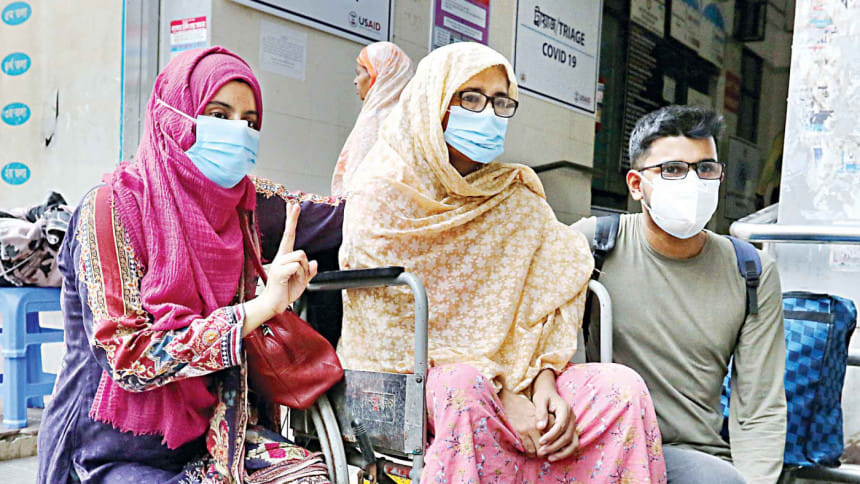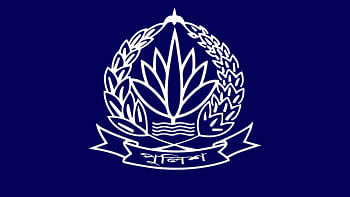Tackling Covid Surge: Govt plans to isolate big cities

Amid fears of a further surge in Covid-19 infections, the government plans to segregate the big cities with higher transmission rate from the rest of the country and extend the nationwide restrictions with stricter surveillance.
A preliminary decision in this regard was made yesterday at a virtual meeting presided over by Health Minister Zahid Maleque. It may be finalised at today's cabinet meeting, said several top officials.
The ongoing restrictions are likely to be extended till May 17, mentioned the officials present at yesterday's meeting.
"As the infection rate is higher in the big cities, recommendations were made for segregating those [from the rest of the country] and the mayors concerned agreed. No vehicle will be allowed to enter or leave these cities. However, vehicles will run within those cities," said Prof Dr ABM Khurshid Alam, director general of the health directorate, who attended the meeting.
The government will allow public transport to operate inside the cities, but inter-district transport services will not resume anytime soon, he told this newspaper.
The meeting was attended by, among others, Dhaka South City Corporation Mayor Sheikh Fazle Noor Taposh, Dhaka North City Corporation Mayor Atiqul Islam, Inspector General of Police Benazir Ahmed and Health Secretary Lokman Hossain Miah.
It also decided that mobile courts will be engaged in penalising the shopping malls that are not adhering to the health safety guidelines.
"People who will go outside without masks will be jailed or fined as per section-269 of the penal code. The cabinet may issue a circular in this regard," said Khurshid.
The circular will also include other directives aimed at curbing the virus transmission, he mentioned.
At the meeting, the Directorate General of Health Services (DGHS) placed a set of recommendations as the ongoing restrictions proved not so effective, he said.
The recommendations include district-wise lockdown, shutting down shops and malls that are not following the health safety guidelines and amendment to the Infectious Disease Control and Prevention Act 2018.
"We have observed that most of the cases of virus transmission occurred in the city corporation areas. We have recommended stricter surveillance in the cities. Otherwise, there is a high risk of a rise in transmission again.
"The upcoming restrictions will not be like the current ones… We have discussed the next course of action to contain Covid-19. Hopefully, we will get a final announcement tomorrow [today]," Khurshid added.
According to health ministry sources, the cabinet today will decide on the recommendations discussed at yesterday's meeting.
The cabinet may come up with some decisions, including extension of the ongoing shutdown of public and private offices till the Eid; restrictions on leaving work stations during the holidays; sending garment workers on leave in phases; closure of shops and malls for a certain period after the Eid, they said.
Meanwhile, at another virtual meeting at the health directorate yesterday, the health minister sounded a note of caution, saying that if people remain indifferent to the health safety guidelines like they did during the first wave of Covid-19, the country may see a third wave very soon.
As the country was hit by the second Covid wave in the second week of March, the government imposed countrywide restrictions from April 5, which was extended in phases till May 5.
It, however, allowed markets and shopping malls to reopen from April 25.
Though Covid cases have been in decline since mid-April, the DGHS warned that reopening of shopping malls and people's reluctance to comply with the health safety guidelines may lead to a further rise in infections.
Health officials said the risk of virus transmission has gone up recently due to an increase in people's movement ahead of the Eid.
In another development, transport workers yesterday staged demonstrations in different parts of the country, demanding resumption of public transport.
EXPERTS' WARNING
Experts have warned that huge gatherings at shopping malls and a possible mad-rush ahead of the Eid may increase the virus transmission once again.
People in large numbers are likely to leave the capital for village homes to celebrate the Eid with their loved ones. In normal times, 80 lakh to 1.2 crore people leave Dhaka, Narayanganj, and Gazipur before the Eid, according to passenger welfare organisations.
The DGHS data shows that the number of Covid cases went up after every home rush.
To ease the rush this time, the government is likely to extend the closure of public and private offices until the Eid as there would be only three working days between May 6 and the Eid holidays, a Cabinet Division official told this newspaper, seeking anonymity.
Earlier on Wednesday, the National Technical Advisory Committee on Covid-19 advised the government to be stricter in enforcing the health safety guidelines.

 For all latest news, follow The Daily Star's Google News channel.
For all latest news, follow The Daily Star's Google News channel. 



Comments